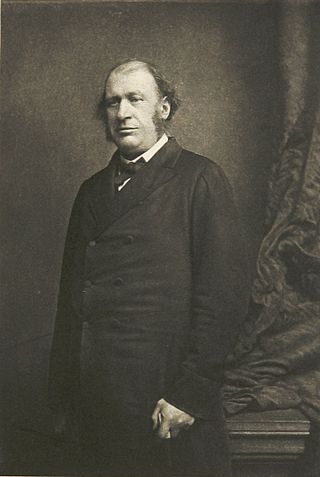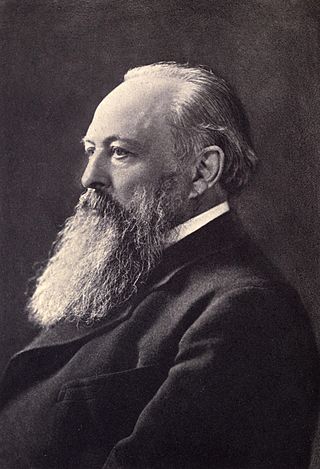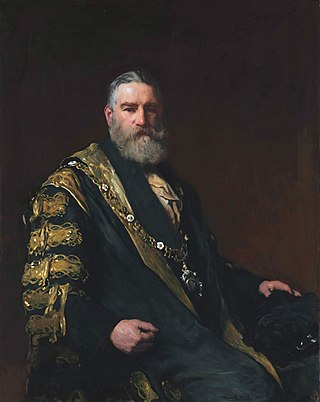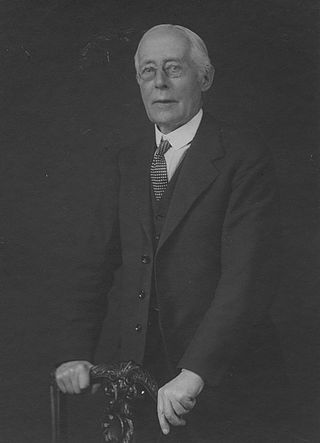Related Research Articles

Sir James Fitzjames Stephen, 1st Baronet, KCSI was an English lawyer, judge, writer, and philosopher. One of the most famous critics of John Stuart Mill, Stephen achieved prominence as a philosopher, law reformer, and writer.

John Emerich Edward Dalberg-Acton, 1st Baron Acton, 13th Marquess of Groppoli,, better known as Lord Acton, was an English Catholic historian, politician, and writer. He is best remembered for the remark he wrote in a letter to an Anglican bishop in 1887: "Power tends to corrupt, and absolute power corrupts absolutely."

Arthur Wellesley Peel, 1st Viscount Peel,, was a British Liberal politician, who sat in the House of Commons from 1865 to 1895. He was Speaker of the House of Commons from 1884 until 1895, when he was raised to the peerage.

Earl Peel is a title in the Peerage of the United Kingdom. The Peel family descends from Robert Peel, eldest son of a wealthy cotton merchant. The family lands, known as Drayton Manor, in the County of Stafford would become more commonly known in modern-day as an amusement park. The family seat is Elmire House, near Ripon, North Yorkshire.

Sir Syed Ahmad KhanKCSI was an Indian Muslim reformer, philosopher, and educationist in nineteenth-century British India. Though initially espousing Hindu–Muslim unity, he became the pioneer of Muslim nationalism in India and is widely credited as the father of the two-nation theory, which formed the basis of the Pakistan movement. Born into a family with strong debts to the Mughal court, Ahmad studied science and the Quran within the court. He was awarded an honorary LLD from the University of Edinburgh in 1889.

Sir Frederick Pollock, 3rd Baronet PC, FBA was an English jurist best known for his History of English Law before the Time of Edward I, written with F.W. Maitland, and his lifelong correspondence with US Supreme Court Justice Oliver Wendell Holmes. He was a Cambridge Apostle.

Sir John Strachey was an English civil servant in British India.

Raymond Wilson Chambers was a British literary scholar, author, librarian and academic; throughout his career he was associated with University College London (UCL).

Sir John Henry Kennaway, 3rd Baronet, was an English Conservative Party politician.

There have been eight baronetcies created for persons with the surname Wilson, one in the Baronetage of Ireland and six in the Baronetage of the United Kingdom.

Sir Robert Nicholas Fowler, 1st Baronet DL JP was a member of parliament and Lord Mayor of London.

Edward Jenks, FBA (1861–1939) was an English jurist, and noted writer on law and its place in history. Born on 20 February 1861 in Lambeth, London, to Robert Jenks, upholsterer, and his wife Frances Sarah, née Jones, he was educated at Dulwich College (1874–77) and King's College, Cambridge, where he was scholar (1886) and, in 1889-95, fellow. He graduated B.A., LL.B. in 1886, and M.A. in 1890. He was awarded the Le Bas Prize and the Thirlwall Prize and was chancellor's medallist. In 1887 he was called to the Bar and for the next two years lectured at Pembroke and Jesus colleges, Cambridge.
Maharaja Sir Mohammad Ali Mohammad Khan, Khan Bahadur, KCSI, KCIE was the Raja of Mahmudabad from 28 June 1903 to 23 March 1931 and a noted politician, zamindar of British India.
Sir Edward Strachey, 3rd Baronet (1812–1901) was an English man of letters.

Sir Archibald Alison, 1st Baronet, was an England-born Scottish advocate (attorney) and historian. He held several prominent legal appointments. He was the younger son of the Episcopalian cleric and author Archibald Alison. His elder brother was the physician and social reformer William Alison.
The Aligarh Movement was the push to establish a modern system of Western–style scientific education for the Muslim population of British India, during the later decades of the 19th century. The movement's name derives from the fact that its core and origins lay in the city of Aligarh in Central India and, in particular, with the foundation of the Muhammadan Anglo-Oriental College in 1875. The founder of the oriental college, and the other educational institutions that developed from it, was Sir Syed Ahmed Khan. He became the leading light of the wider Aligarh Movement.
Muhammadan Anglo-Oriental College was founded in 1875 by Sir Syed Ahmad Khan, initially as a primary school, with the intention of turning it to a college level institution. It was inspired by the Cambridge education system. It started operations on Queen Victoria's 56th birthday, 24 May 1875.

Lieutenant-General Sir Archdale Wilson, 1st Baronet, GCB was a British Bengal Army and British Army artillery officer who saw service during the Second Sikh War and the Indian Rebellion of 1857, during which he was commended for his part in the capture of Delhi and the relief of Lucknow. For his actions during the rebellion, Wilson was knighted and created a baronet. He later returned to the United Kingdom, where he became a Colonel commandant of the Royal Artillery.
References
- ↑ Burke's Peerage, Baronetage and Knightage thirtieth edition, 1868, pg 1185
- ↑ "Wilson, Roland (WL859RK)". A Cambridge Alumni Database. University of Cambridge.
- Who Was Who 1897-2006. Retrieved March 27, 2007, from http://www.xreferplus.com/entry/6209215.